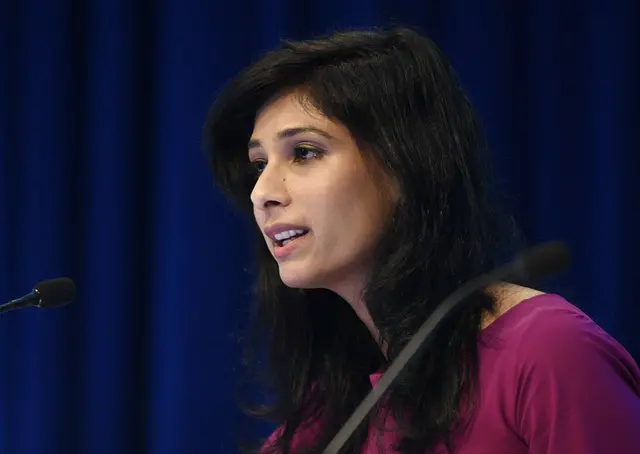China is expected to grow by 1 percent, the only major economy that could see growth this year.
WASHINGTON, June 24 (Xinhua) -- The International Monetary Fund (IMF) on Wednesday revised down its forecast for the global economy amid the mounting COVID-19 fallout, projecting a 4.9-percent contraction in 2020.
The latest projection is 1.9 percentage points below the World Economic Outlook (WEO) forecast released in April, indicating a grimmer economic outlook as the pandemic continues to ripple across the globe.
"Compared to our April World Economic Outlook forecast, we are now projecting a deeper recession in 2020 and a slower recovery in 2021," IMF Chief Economist Gita Gopinath said in a virtual news conference, noting that these projections imply a cumulative loss to the global economy over two years of over 12 trillion U.S. dollars from the crisis.
"The downgrade from April reflects worse than anticipated outcomes in the first half of this year, an expectation of more persistent social distancing into the second half of this year, and damage to supply potential," Gopinath told reporters.

People do shopping at the Macy's flagship store in New York, the United States, on June 22, 2020. New York City, the largest city of the United States, entered phase two of reopening on Monday, marking a major milestone of the city's fight against COVID-19. As Mayor Bill de Blasio said, the transitioning is "a giant step for this city" with the largest chunk of New York's economy reopening in phase two, including barbershops, hair salons, real estate, vehicle sales and rentals. (Xinhua/Wang Ying)
Advanced economies are projected to contract 8 percent this year, 1.9 percentage points lower than the forecast in the April WEO.
The U.S. economy is expected to shrink 8 percent, the Euro Area is on track to contract 10.2 percent, and the Japanese economy could decline 5.8 percent.
Emerging markets and developing economies, meanwhile, are projected to shrink by 3 percent this year, 2 percentage points below the April WEO forecast, according to the updated report.
Brazil and Mexico are projected to contract by 9.1 and 10.5 percent respectively, while India's economy could see a contraction of 4.5 percent. China is expected to grow by 1 percent, the only major economy that could see growth this year.

People purchase goods at a night fair in east China's Shanghai, June 6, 2020. Shanghai, one of China's national central cities, kicked off a night festival on Saturday to boost the city's night economy. A number of bars, museums, bookstores, shopping malls and landmark commercial complexes joined the festival with extended business hours and themed activities like night tours, shopping, dining, reading and live shows. (Xinhua/Wang Xiang)
The latest report also showed that global growth is projected at 5.4 percent in 2021, which would leave 2021 gross domestic product (GDP) some 6.5 percentage points lower than in the pre-COVID-19 projections made in January 2020.
Warning that the crisis will also generate medium-term challenges, Gopinath said that public debt this year is projected to reach the highest level in recorded history in relation to GDP, in both advanced and emerging markets and developing economies.
"Countries will need sound fiscal frameworks for medium-term consolidation, through cutting back on wasteful spending, widening the tax base, minimizing tax avoidance, and greater progressivity in taxation in some countries," she said.

File photo taken on April 13, 2020 shows a man crossing a road in the rain near the International Monetary Fund (IMF) Headquarters in Washington D.C., the United States. (Xinhua/Liu Jie)
The IMF chief economist noted that a high degree of uncertainty surrounds this forecast, with both upside and downside risks to the outlook. On the upside, better news on vaccines and treatments, as well as additional policy support, could lead to a quicker resumption of economic activity, she said.
On the downside, further waves of infections could reverse increased mobility and spending, and rapidly tighten financial conditions, triggering debt distress, she said, adding that geopolitical and trade tensions could damage fragile global relationships at a time when trade is projected to collapse by around 12 percent.
Noting that global cooperation is more than ever "so important" when dealing with a truly global crisis, Gopinath said that every effort should be made to resolve trade and technology tensions while improving the multilateral rules-based trading system. ■
 简体中文
简体中文

